The first lesson that one learns at the Naval Academy is that of Chetwode motto comprising three principles, which are “the safety, honor and welfare of your country comes first, always and every time; second, the honor, welfare and comfort of the men you command comes next. Third, your own ease, comfort and safety comes last, always and every time"
Commodore Rakesh Anand, (retd.) is the Chairman and Managing Director of Mazagon Dock Shipbuilders Ltd since January 2017. He has earlier served in the Indian Navy for about 30 years and has held various assignments, both ashore and afloat on INS Vijeta, INS Porbandar, INS Saryu and INS Godavari. He has served at both the Naval Dockyards at Visakhapatnam and Mumbai in various capacities, headed the Fleet Maintenance Unit, Mumbai, and held the chair of Command Engineer Officer at the Headquarters, Western Naval Command. He has also served at the Directorate of Naval Design (Submarine Design Group) and the Directorate of Marine Engineering at Naval Headquarters. In his capacity as Chairman and Managing Director, Mazagon Dock Shipbuilders Limited, is a radical shift to the corporate world from serving on Naval ships to building those ships instead. The industrial work environment, he stresses, is going through changing times due to the disruptive technologies being adopted globally. These technologies are bringing about changes in organizational structures, manufacturing processes and the skill sets required to function effectively in the new manufacturing milieu. It is, therefore, essential that these technological and organizational changes are quickly adopted by corporates in the country, so as to ensure that they remain competitive at a global level. Foreseeing such changes at a global level and systematic implementation in our corporates is the single most critical challenge which corporates face today

I am a Mechanical Engineer from the Thapar Institute at Patiala. As it was also my childhood dream to pursue flying, I enrolled with the Patiala Flying Club concurrently while doing my graduation studies. I seriously considered pursuing commercial flying at one-time, during post-graduation. However, destiny had other plans for me. I went ahead and joined the Indian Navy, for which I was selected during the pre-final year. I was commissioned in the Indian Navy on September 1st 1979 and joined the Naval Academy at Kochi on August 15 1980.
The first lesson that one learns at the Naval Academy is that of Chetwode motto comprising three principles, which are “the safety, honor and welfare of your country comes first, always and every time; second, the honor, welfare and comfort of the men you command comes next. Third, your own ease, comfort and safety comes last, always and every time. The other major learning pertains to discipline and team man ship, wherein you win or lose in any activity as a team and not as individuals. The nature of wholesome training provided at the Service Academies, is possibly the best in the world.
 Pushpak Aircraft flown by Rakesh Anand at Patiala Flying Club
Pushpak Aircraft flown by Rakesh Anand at Patiala Flying ClubI joined MDL on 29th June 2010 after putting in 30 years in the Indian Navy.
A vacancy was advertised for the post of a General Manager (Technical). I opted to join MDL on permanent absorption basis and was selected after an interview.
It is a corporate body. It is a Public Sector Shipyard functioning under the Ministry of Defense (Department of Defense Production). It is the oldest shipbuilding yard of the country (about 250 years old) and a part of our national heritage. I am extremely proud to be part of the MDL team as this organization is supporting the cause of National Defense and Nation Building.
Having served for 30 years in the Indian Navy right from the time that one graduated, the culture of the Navy totally grows on you. The Military life is built around the values of loyalty, duty, service before self, honor, integrity and personal courage. Apart from this, service personnel live by certain principles (some written, other unwritten), which are unit cohesion, concern for reputation and Stoicism. In the services, directives once issued by superior officers have to be followed by the subordinates, even if it is at the peril to his life. Having come from such an environment into a corporate culture one is impacted initially and it takes a while to acclimatize to the new environment.
 Distinguished Alumni Award by Thapar University
Distinguished Alumni Award by Thapar University Patrolling off A&N Island, onboard INS Saryu, 1993
Patrolling off A&N Island, onboard INS Saryu, 1993To elaborate a few examples would be:-
As a civilian, a person’s boss has authority over that person, while he or she is at work, but in the services, a service member’s boss has authority over almost all aspects of their life, even when a service member has a “day off”. Commanders in the services are responsible for their subordinates’ conduct both on and off duty.
The other difference is the basis of decision making in a strictly disciplined organization with a rigid channel of command, wherein once a directive or order is passed, it is considered to be executed unless reported otherwise. In the services, one never assumes things. If you don’t know, clarify. In a combat situation, if a directive has not been followed or one of the team members assumes wrongly, there could be a major lapse and could lead to loss of life. In the corporate set up, the pace of conformance and confirmation to orders is relatively slower and it thus takes time to execute jobs.
MDL employs about 8500 employees, 7500 operatives and staff and about 1100 executives.
The basics of modern management, as we all know, has been adopted from the Armed Forces. Amongst others, the basic principles, which are based on the ideas of renowned Prussian Military Theorist, “Carl Von Clausewitz” can be cited. He believed that war and business shared a good deal of similarities and that both involve a clash of interest. These insights not only significantly influence modern business, but also offers an opportunity for Managers, who want to improve their global business strategies.
The principles, which hold similarities are those of objective, offensive, mass, manoeuvre, surprise and simplicity.
By adopting the above principles in corporate, one can put oneself in a position to scale your company and maintain an advantage against changing markets and new competitions over time.
It is not a question of one’s comfort or discomfort. It is a matter of reality that as we discuss, the world is changing around us at a stupendous pace. These changes are being driven by technological evolution and changes to the social fabric of the country. While on one end, disruptive technological changes driven by Industry 3.0 and Industry 4.0 are revolutionizing the way we work, on the other end the millennial generation, with their very strong ideas of working in an informal organization structure, is driving organizations to be flatter. These changes in the future are imminent and one needs to gear up to function in such flexible organizations.
Both Industry 3.0 and 4.0 have been implemented in a number of industries globally and the same have radically enhanced the flexibility, with which they function. These industries have started adopting leaner production norms, which is making them more productive and cost-effective.
Having served for 30 years in the Indian Navy right from the time that one graduated, the culture of the Navy totally grows on you

As far as working hours go, normally one does try to maintain a work-life balance, however, one ends up putting in 10-12 hours of work. One has always worked on a Saturday, though we are a five-day week company. There is a lot to be done as the company has to be progressed, and there are a lot of new challenges, for which we have to gear up. Both diet and exercise are extremely important to maintain fitness. I try doing a few yoga sessions during weekdays. During the weekends, whenever possible, I go out on long walks.
It was an arranged marriage and we got married in 1986. We come from a very educated but simple family backgrounds.
The current generation has a huge exposure to all form of media, social, print and electronic. Western Culture is thus easily seen by the young generation, wherein there is no taboo about divorce. Another reason is that the education level has increased in society, which leads to better job availability and consequently the earning potential. Yet the young generation is not satisfied as they have become extremely materialistic. Further, the tolerance level of individuals has also come down. Earlier married couples bowed to the pressure of society to make their marriage work. However, today couples take their relationship casually and head to the Courts without trying to work on a possible solution to save their marriage. By instilling solid sanskaars amongst the children, they will not be overwhelmed by the Western culture and will be able to have successful married lives.
My elder daughter, Shagun, is an engineer and an MBA from IIM-B. She is working with Zensar Technologies. My younger daughter, Shruti, has pursued her MBA from SIMS and is eager to pursue further education from the US.
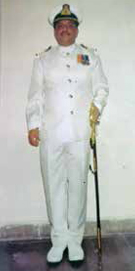
 Patiala Flying Club
Patiala Flying ClubWe have tried to instil the same values, which were ingrained upon us since our childhood. In fact, I keep telling them, whether they implement or not, these values are universal and timeless. I always tell them that discipline comes first. Never forget: wherever you are and whatever you do, respect your motherland. Apart from this, honesty, sincerity and the dignity of life for everybody in all relationships and dealings with your parents, friends, peer group are very important aspects. These are the fundamentals that make you a good human being.
As parents, we have the moral obligation to groom our children, so that they grow up to be responsible citizens of the country and carry the legacy to the next generation. Good habits, discipline, character, work ethics and so on have to be inculcated from childhood. Children must know that there is only one way of doing things and that is the right way. Breaking rules by the children must come with a penalty. They are also to be told to achieve academic excellence through discipline. Children must also be made accountable so that they are confident in taking decisions, which leads to success. Children should not be mollycoddled to the extent that they know only about their rights and not about their accountability.
To be a good human being and to be true to your country, family and profession on a daily basis and over, time, contribute to building a stronger nation. It is also essential that we keep upgrading ourselves technologically so that in the case of MDL, we are able to build state-of-art warships and submarines at par with best in the world in a time-bound manner. It is also important that the downtrodden and underprivileged in the country are supported in the best possible manner. Environmental concern for all citizens is also essential and sincere efforts are to be made by all to leave behind an ecosystem, which is better than the one inherited by us. Since childhood, one of the books, which has had a profound influence on my thinking, is the “Jonathan Livingston Seagull” authored by Richard Bach, which in a very simple manner summarizes the raison deter of life i.e. to put in hard work and excel in whatever one does.
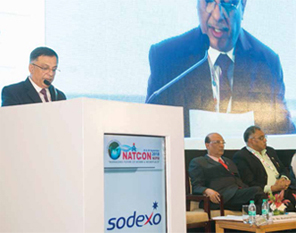
Many of the ways of working that we have taken for granted for 20 years are disappearing viz. working from nine to five, aligning only with one company, spending time with family, taking weekends off, working with people we have known well in offices we go to, every day. We live in a time, when the gap with the past is of the same magnitude, as that last seen in the late 18th century. The gap is of such a magnitude that what we do, where we do it, how we work and with whom, will change possibly unrecognizably in our lifetime. In the late 18th century, the drivers of this change were the development of coal and steam power. This time it is not the result of a single force, but rather a combination of five forces that will fundamentally transform much of what we take for granted about work.
In 1970, with the onset of 3rd Industrial revolution, automation of production increased and automotive industries started using robotics in manufacturing. With time, the robots evolved and became more dexterous and able to work “hand-in-hand” with employees. It was during this period of transformation, where more and more robots were brought into the assembly line to perform the tasks, which were performed by humans. This led to the displacement of millions of blue-collar workers.
In the current era, developed countries may be on the verge of a similar transition again. Robotics and machine learning have improved productivity and enhanced the economies of many nations. Artificial Intelligence (AI) has advanced into finance, transportation, defense, and energy management. The internet of things (IoT) is facilitated by high-speed networks and remote sensors to connect people and businesses. In all of this, there is a possibility of a new era that could improve the lives of many people. Yet amidst these possible benefits, there is widespread fear that robots and AI will take jobs and throw millions of people into poverty. This led to the displacement of millions of white-collar employees with many expressing concern that this will lead to a vast increase in income inequality, the creation of a mass of people, who are effectively unemployable and thus create a breakdown of the social order.
The future of work is going to be on demand. No one is going to guarantee you a lifetime career. Many businesses are choosing contract relationship over hiring a new employee. Career is as outdated as the word “Typewriter”. In future Project teams akin to Movie Production team would be created where individuals with unique talents get together to work on a company’s project. At the end, they go on separate ways and may or may not work together again. Further, virtual teams i.e. a group of individuals, who work across time-space and organizational boundaries using collaborative technologies, will become the order of the day. Although the home is the most common location, millions of team members would work from just about anywhere. In the future of work, individuals will have more freedom and power than ever before. Earning potential will be based on merit and not on location. Employees will have access to a larger and more skilled workforce.
The five major trends that are changing the future of work are Globalization, New Technology, Millennial workforce, Mobility and New Behavior.
With the increasing international influence of organizations, boundaries are getting blurred and the world is becoming a City. The impact of currencies, languages and geographical locations is no more there. There is a lot of data that is available right from a farm worker to a person sitting in an office in Silicon Valley. The full impact of globalization in the workplace has yet to be realized, but as more companies embrace this trend and become more diverse, certain changes are emerging. Globalization and virtual workplaces will also play an increasing role in the changing landscape of workplace, causing more fluid shifts and flows of talent. As globalization becomes more prevalent, companies deal with increased cultural diversity within the workforce. These changes require that small and large businesses adopt new policies and guidelines for workers.
As more companies have access to overseas companies that offer outsourcing, wages have changed for many workers. With lower standards of living, third world companies can offer their services at a rate greatly reduced from those in countries with higher standards of living. This has affected many workers in the United States as well as other large countries, as more companies embrace the outsourcing trend. While it means a greater profit margin for the companies, it also leads to reduced earning potential for employees. Globalization has led to the dislocation of jobs.
Globalization has led to the creation of many millions of new jobs worldwide. However, globalization does mean many jobs are outsourced from one country to another because of lower labor costs; which means a lot of people who used to work in those jobs are out of work and must find new jobs. Technically speaking, however, the jobs still exist, they are simply located in a country with lower labor costs.
The new technologies, which are going to drive the future of work are Cloud Collaboration, Big Data, Internet of Things, Wearable devices and Cloud computing.
Digitization and automation will make 20-30% of jobs obsolete over the next 5-10 years, but only 16% of companies feel they are ready for the change. We have seen the changes, which automation has brought on blue-collar work. Visit the factories of a manufacturing company and you find very few people there. When this development started to accelerate in the 1970s robots were denounced as “Job Killers”. But by now we have learnt to live with it. But today we are seeing similar changes for white-collar employees due to the emergence of big data and Artificial Intelligence. What is new about this technology is that it no longer solely depends on the input of people, but can learn, adapt and generate algorithms on its own, as in the case of deep machine learning.
The way we work is changing, and, not surprisingly, technology is playing a big part in that shift. A conversation about the workplace almost always starts with technology. Indeed, technology is the enabling factor that allows anybody, anytime, to complete work from almost anywhere. As technology is further embedded into the office, it will continue to help people work and think more effectively and efficiently.
The millennia’s joining workforce now are employees born between 1982 and 2002. By 2020, they will constitute 50% and by 2025 75% of the total workforce worldwide.
Unlike the Gen-Xers and the Baby Boomers, the millennia’s have developed work characteristics and tendencies from doting parents, structured lives, and contact with diverse people. They are used to working in teams and want to make friends with people at work, work well with diverse co-workers.
millennia’s have a can-do attitude about tasks at work and look for feedback about how they are doing frequently. millennia’s want a variety of tasks and expect that they will accomplish every one of them. Positive and confident, millennia’s are ready to take on the world.
They seek leadership, and even structure, from their older and managerial coworkers, but expect that you will draw out and respect their ideas. millennia’s seek a challenge and do not want to experience boredom.
They need to see where their career is going and they want to know exactly what they need to do to get there. millennia’s await their next challenge and their better be the next challenge.
They are also highly connected through social media. They work hard, but they are not into the sixty-hour work weeks defined by the Baby Boomers. Home, family, spending time with the children and families, are priorities. Don’t lose sight of this. Balance and multiple activities are important to these millennial employees. Ignore this at your peril.
millennia’s want to enjoy their work. They want to enjoy their workplace. They want to make friends in their workplace. Worry if your millennial employees aren’t laughing, going out with workplace friends for lunch, and helping plan the next company event or committee. Help your long-term employees make room for the millennial.
The future of work is going to be on demand. No one is going to guarantee you a lifetime career. Many businesses are choosing contract relationship over hiring a new employee. Career is as outdated as the word “Typewriter”
Mobility would give freedom to employees to work anytime anywhere and on any device. Global mobility will grow in importance particularly for large firms with more than a lakh of employees. Assignments will move to short-term projects of up to three months or a year. There will be more cross-border commuters, living and working in different countries.
In the “gig-economy” a lot of people will be working where small contracts will be awarded at short notice to independent freelancers or part-time employees. Independent contractors looking for these individual tasks advertise on online platforms for crowd-working and shared services. Work-on-demand via an app in different sectors is also part of gig economy and this is going to increase in terms of participation by 2025 to 50%.
Jobs are becoming more granular, increasingly broken down to a project or task level, with decreasing emphasis on the number of hours someone works. Instead, the activity and its role in a sequence of dependencies are becoming the atomic “thing” people care about.
Today everything is known about any individual, which would have been impossible to conceive about a few years ago. This is being made possible by the social media and the web, i.e. Twitter, Facebook and LinkedIn. Thus, we are quite open to people knowing about our profile. In other words, we are getting collaborative.
She’s bubbly, effervescent, a complete people’s person and the perfect match to her husband, Rakesh Anand. Supportive, warm, friendly approachable and full of verve, Seema Anand has lived the ups and downs of both a naval career, as well as the corporate environment of the Mazagon Dock for over 32 years now along with her husband. What’s more she wears as many hats as her husband with as much aplomb: proud fauji wife, a largely single parent to their two daughters while her husband was on ship, a passionate teacher of mathematics to batches and batches of neighbourhood children, as well as a keen volunteer for children with learning difficulties at the schools assigned to her by the NGO (Children’s Movement for Civic Awareness) (CMCA) that seeks to develop children as engineers of civic change in the days to come
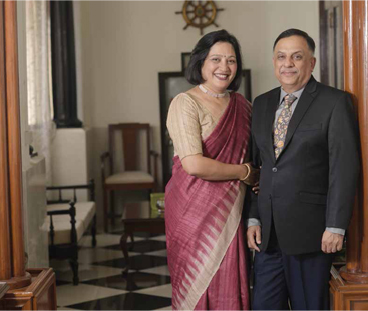
Seema Anand: Like he mentioned, it was an arranged match way back in 1986. I was only 19 odd years and had just completed my BA in Maths and Statistics. As arranged marriages usually worked, we met through a common contact. I told him upfront about certain chronic health issues I had and he was impressed with my honesty and truthfulness. So he saw beyond those things to see me for the person I am.
I am talkative and outgoing, whereas he is a man of few words. However, he is immensely caring and solicitous of both my needs as well as those of our daughters. That's a beautiful quality to have. He's a workaholic, devoted to his work, hugely intelligent to boot. He has a simple philosophy that is very inspiring to all of us a family: he says that he is doing routine things differently that makes all the difference in the long work. Whatever the task on hand, be sure to give it that little bit extra. It is the one thing that will separate you and your work from the rest.
Oh, quite a few. The naval world is like a family with everyone watching out for the other. The base was very self-sufficient as well, so we lived in our own happy little world. (smiles). We have friends, who have stood by us since the day we got married. Even when the husbands were sailing, they could do so with a light heart, knowing that we ladies would take care of each other. Amidst all this, you also learn to be a good organizer and hostess, capable of putting together a spread on the table for whatever the occasion might be: a casual dinner with just a few course mates and friends in attendance or an all-out formal do. Plus, all fauji wives eventually learn to be good timekeepers as they have to be able to get ready in a jiffy. Whatever the situation, you also learn to be adaptable; it's little wonder that services people can get along with everyone, irrespective of their age or stage in life.
In those days when the husbands sailed there were no mobile phones or e-mail to help us keep in touch, so you tended to keep the problems to yourself: be it the girls falling sick or your own little issues. At all times, one had to keep in mind that the husband was sailing, so he had enough tensions to deal with. But overall, there have been very few complaints.
It was a bit of a shock initially. The naval world is very warm and welcoming; here, however, people took time accepting and welcoming you into the fold. In the early days, I missed the family-like environment and the companionship that the naval world gave us wives. But I had to take it my stride. Over and above, I believe in one thing: give respect, get respect, be it to officer's wife or any other staff. Slowly but surely, I began to like it here.
In those days when the husbands sailed there were no mobile phones or e-mail to help us keep in touch, so you tended to keep the problems to yourself: be it the girls falling sick or your own little issues
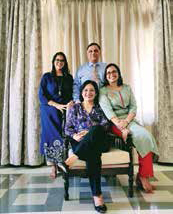
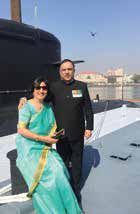
Support and care for each other, no matter what you do. For example, he has always taken care of my health issues. Understand each other's situation, no matter how difficult it is. Don't let little things escalate. Adjust. For example: when he comes home from a hard day at work and wants the remote to the TV, let him. After all, as a wife, you may have had the whole day to watch TV. Trust is another fundamental. Whether it is the other person's judgment or integrity, trust your spouse. Most important of all is patience. I say this with special emphasis on the younger generation in particular. (smiles.) Patience is not just important for the wife; husbands have to be patient as well. It takes two to make a situation work.
Well, they are both opposite personalities. My elder one Shagun is more like her father: quiet, composed, a person of few words. The younger one Shruti is more like me, fun-loving and expressive. But both are, by God's grace, intelligent and capable. Plus, they both simply adore their daddy. He shares a close bond with them despite the months he spent sailing. They admire him for his knowledge, dedication and honesty.

At times yes, because I am an educated and capable person myself. I am aware that having a career of your own adds a different dimension to your personality and conversational skills. It so happened that around the time we got married, I also qualified for my MBA entrance as well. But it wasn't practical to work considering his postings as well as the fact that I had my in-laws with me. Plus, when the girls were born, I was largely managing them all alone. But despite all this, I managed to carve out a niche for myself. I am excellent at mathematics; numbers and equations come easily to me. It all started with a neighbor asking me to help out with her kid; one thing led to another and there has been no looking back since.
While I have not worked in a school, I have closely enjoyed the joys of teaching and communicating with kids, as I have taught batches and batches of children. It's really heartening when children choose to travel long distances just to be able to attend your classes. Over the years, they have kept in touch, the warmth and the memories are beautiful, and that's quite amazing.
I believe in making others around me comfortable, be it in the precincts of Mazagon Dock or within my friend circle. People should be able to communicate with you, reach out to you as a person. I am also a firm advocate for environmental issues as well as children’s rights to inclusion. The NGO I volunteer for: namely the Children’s Movement for Civic Awareness (CMCA) that seeks to develop children as engineers of civic change, gives me an opportunity to do both.
By Vinita Deshmukh and Kalyani Sardesai